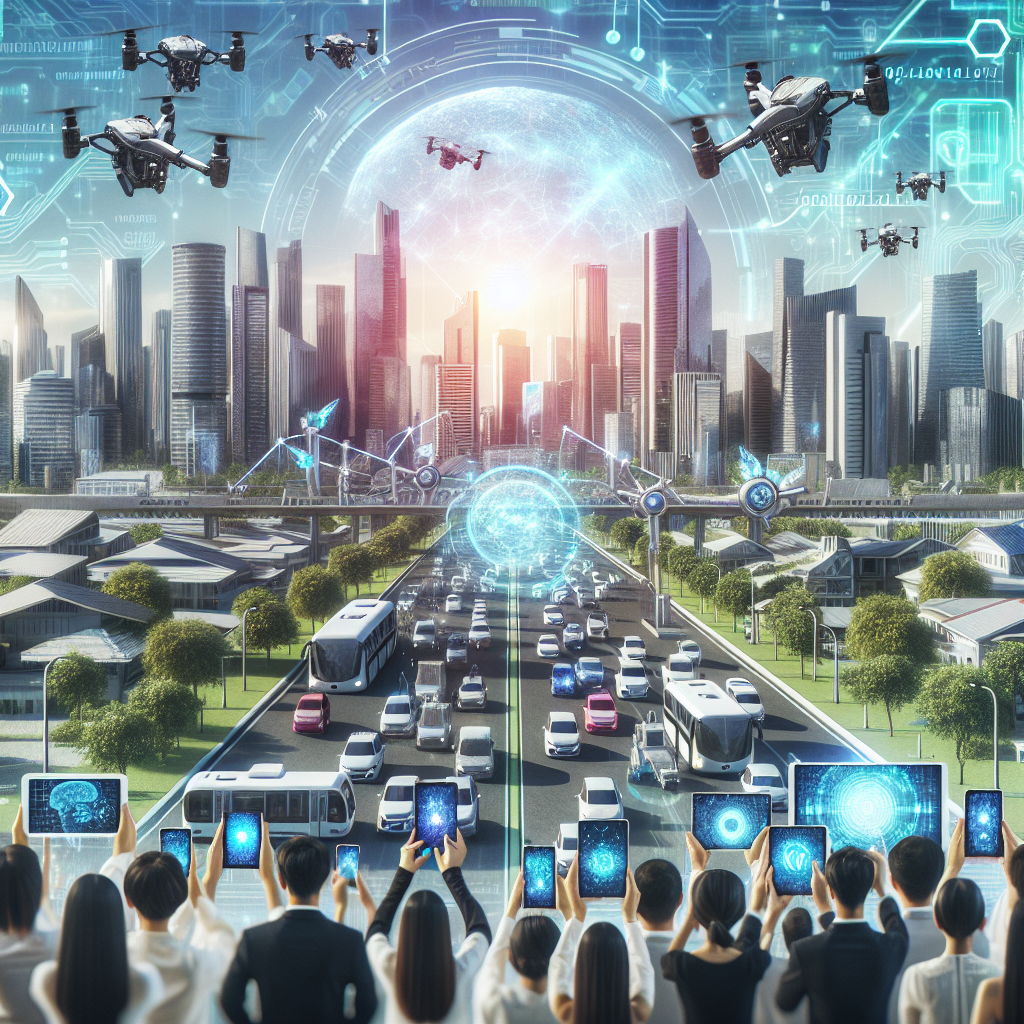The concept of smart cities has been gaining traction in recent years as urban areas look for innovative ways to improve efficiency, sustainability, and quality of life for their residents. One of the key technologies driving this transformation is artificial intelligence (AI). AI solutions are being increasingly integrated into smart city initiatives to help cities manage infrastructure, transportation, public services, and more.
AI technology has the potential to revolutionize the way cities operate by enabling data-driven decision-making, predictive analytics, and automation of various processes. From traffic management to waste management, AI can help cities run more smoothly and efficiently. In this article, we will explore the role of AI solutions in smart cities and how they are being used to address some of the most pressing urban challenges.
Traffic Management
One of the most common applications of AI in smart cities is in traffic management. AI-powered systems can analyze real-time traffic data from sensors, cameras, and other sources to optimize traffic flow, reduce congestion, and improve safety. For example, AI algorithms can predict traffic patterns and adjust traffic signals in real-time to minimize delays and improve the overall flow of traffic.
AI can also be used to identify traffic violations, monitor parking violations, and enforce traffic laws more effectively. By using AI-powered cameras and sensors, cities can automatically detect and issue tickets for violations such as speeding, running red lights, and illegal parking. This not only helps improve traffic safety but also generates revenue for the city.
Public Safety
AI solutions are also being used to enhance public safety in smart cities. For example, AI-powered video surveillance systems can detect suspicious behavior, identify potential threats, and alert law enforcement in real-time. These systems can also analyze video footage to help solve crimes, track missing persons, and improve emergency response times.
AI can also be used to analyze social media data, news reports, and other sources of information to identify potential security threats and prevent crime before it happens. By using AI algorithms to sift through vast amounts of data, law enforcement agencies can better assess risks, allocate resources, and respond to incidents more effectively.
Energy Management
Another area where AI is making a big impact in smart cities is in energy management. AI-powered systems can analyze energy consumption patterns, predict demand, and optimize energy usage to reduce costs and minimize environmental impact. For example, AI algorithms can adjust lighting, heating, and cooling systems in buildings based on occupancy levels, weather conditions, and other factors to save energy and lower utility bills.
AI can also help cities integrate renewable energy sources, such as solar panels and wind turbines, into their energy grids more efficiently. By analyzing weather forecasts, energy production data, and demand patterns, AI can help cities maximize the use of renewable energy sources and reduce their reliance on fossil fuels.
Waste Management
AI solutions are also being used to improve waste management in smart cities. AI-powered sensors can monitor waste levels in trash bins, dumpsters, and recycling centers to optimize collection routes, reduce costs, and minimize waste. By using AI algorithms to predict when bins will be full, cities can schedule pickups more efficiently and avoid overflowing bins.
AI can also help cities implement recycling programs more effectively by identifying recyclable materials, sorting them automatically, and diverting them from landfills. By using AI-powered sorting machines and robots, cities can increase recycling rates, reduce contamination, and promote sustainability.
Smart Infrastructure
AI is also being used to monitor and maintain smart infrastructure in cities, such as bridges, roads, and buildings. AI-powered sensors can detect structural weaknesses, predict maintenance needs, and alert authorities to potential risks. By using AI algorithms to analyze sensor data, cities can prioritize maintenance projects, extend the lifespan of infrastructure, and prevent costly repairs.
AI can also help cities improve urban planning and development by analyzing demographic trends, traffic patterns, and environmental factors. By using AI algorithms to simulate different scenarios and predict future outcomes, cities can make more informed decisions about where to build new infrastructure, how to allocate resources, and how to manage growth.
FAQs
Q: How is AI being used to improve public transportation in smart cities?
A: AI is being used to optimize public transportation routes, schedules, and capacity to reduce overcrowding, minimize delays, and improve the overall passenger experience. By using AI algorithms to analyze ridership data, traffic patterns, and other factors, cities can better manage their public transportation systems and provide more efficient and reliable services.
Q: How can AI help cities reduce air pollution and combat climate change?
A: AI can help cities reduce air pollution and combat climate change by optimizing traffic flow, promoting public transportation, and encouraging the use of electric vehicles. By using AI-powered systems to monitor air quality, analyze emissions data, and predict pollution levels, cities can implement targeted interventions to reduce pollution and improve air quality.
Q: Are there any privacy concerns associated with AI-powered surveillance systems in smart cities?
A: Yes, there are privacy concerns associated with AI-powered surveillance systems in smart cities. These systems can capture and analyze vast amounts of personal data, such as facial recognition, license plate numbers, and location information. Cities must implement proper safeguards, such as data encryption, anonymization, and strict access controls, to protect the privacy and security of their residents.
In conclusion, AI solutions are playing a crucial role in transforming smart cities and addressing some of the most pressing urban challenges. From traffic management to public safety, energy management, waste management, and smart infrastructure, AI is helping cities operate more efficiently, sustainably, and effectively. By leveraging the power of AI technology, cities can improve the quality of life for their residents, promote economic growth, and create more resilient and livable urban environments.

